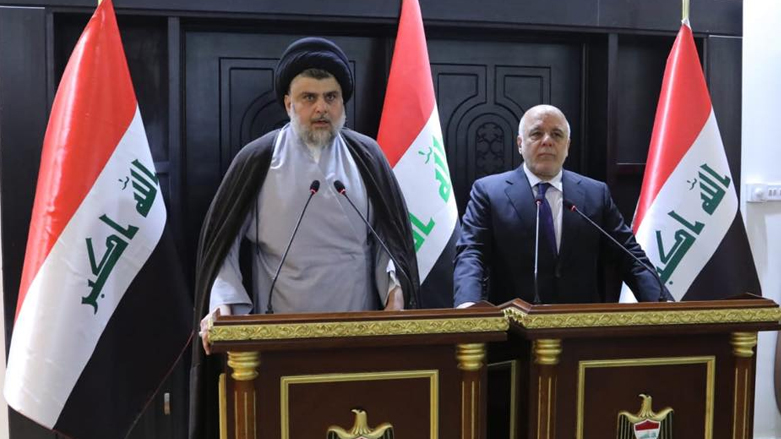Iraqi election winner promises paternal government after meeting with PM Abadi

ERBIL (Kurdistan 24) – Iraqi Prime Minister Haider al-Abadi, who leads the al-Nasr (Victory) alliance, met with the head of the Sairoon alliance, Muqtada al-Sadr, to discuss the formation of a new Iraqi government.
The meeting was held on Saturday evening in Baghdad, a day after the parliamentary election results were announced. Sadr’s alliance ranked first with 54 seats, while Abadi came in third place with 42 seats.
There were no significant differences between the campaign platforms Abadi and Sadr ran on, but neither will be able to form government on their own. The establishment of a new cabinet will require alliances with other winning parties.
In a press conference following the meeting, Abadi stated that he would “move quickly” to advance the political process in a session of parliament with potentially like-minded candidates who won their seats.
According to the Constitution of Iraq, a new government must be formed within 90 days after official election results are announced.
Intense negotiations are expected to follow in the next several weeks as a result of the complex relationships between Shias, Sunni, and the Kurds, and the fragile political situation.
“We are working with His Eminence, Muqtada al-Sadr, together with all other blocs to speed up the formation of a [new] government,” Abadi told reporters during his presser.
“The government must be strong and able to carry the country for the next four years, providing services to its citizens, as well as ensuring its security and prosperity,” he said.
Abadi noted that during his meeting with Sadr, he observed a “convergence of views,” adding, “We do not stand against any of the political blocs.”
“But we need to lead this process and head in the right direction to accelerate the formation of the next government, [after forming] the Council of Representatives.”
Qassim Soleimani, head of the Quds Force of Iran’s Islamic Revolutionary Guard Corps, has been meeting with political parties in Baghdad over the past few days, looking to form the largest bloc and prevent Sadr from leading the creation of the new cabinet. Abadi’s meeting with Sadr might prove to be the biggest hindrance to the controversial Iranian figure’s mission.
Three candidates are competing for the post of Prime Minister of Iraq: Abadi, his predecessor Nouri al-Maliki, and Hadi al-Amiri, who is the former commander of the pro-Iran Shia Hashd al-Shaabi militia and current head of the al-Fatih Alliance, which won 47 seats, the second biggest winner after Sadr.
Whoever is to claim the prime ministership has the daunting task of rebuilding the war-ravaged country and tackling rampant corruption of its oil sector.
The Iraqi government has claimed to need at least $100 billion to rebuild homes, its economy and infrastructure devastated by the three-year-long war.
“This meeting [with Abadi] was a reassuring message to the Iraqi people: that their government will be paternal and inclusive,” Sadr stated while addressing reporters.
Sadr mentioned that “the door is open” to all those who want to build “a sovereign Iraqi homeland.”
Earlier, in his office in Najaf, Sadr met with the leader of the al-Hikma (Wisdom) movement and head of the Shia National Alliance, Ammar al-Hakim, who won 19 seats.
During both press conferences with Abadi and Hakim, Sadr did not reveal whether these meetings were aimed at forming a larger bloc within parliament which would eventually choose the new government.
Sadr did not run in the elections to become Prime Minister, but his big win offers up strong leverage in negotiations on who will lead the next Iraqi government.
Sadr has long been marginalized from other Shia blocs, especially those with close ties to the Islamic Republic of Iran.
Earlier on Saturday, Sadr also met with ambassadors of Iraq's neighboring countries, except for the Iranian envoy. He called on the strengthening of ties with neighboring nations.
Editing by Nadia Riva
